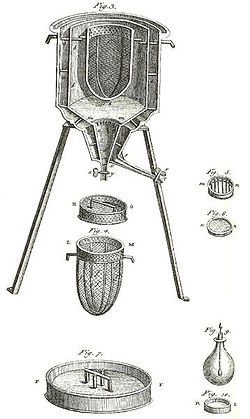- Thermochemistry
-
Thermochemistry is the study of the energy and heat associated with chemical reactions and/or physical transformations. A reaction may release or absorb energy, and a phase change may do the same, such as in melting and boiling. Thermochemistry focuses on these energy changes, particularly on the system's energy exchange with its surroundings. Thermochemistry is useful in predicting reactant and product quantities throughout the course of a given reaction. In combination with entropy determinations, it is also used to predict whether a reaction is spontaneous or non-spontaneous, favorable or unfavorable.
Endothermic reactions absorb heat. Exothermic reactions release heat. Thermochemistry coalesces the concepts of thermodynamics with the concept of energy in the form of chemical bonds. The subject commonly includes calculations of such quantities as heat capacity, heat of combustion, heat of formation, enthalpy, entropy, free energy, and calories.
 The world’s first ice-calorimeter, used in the winter of 1782-83, by Antoine Lavoisier and Pierre-Simon Laplace, to determine the heat evolved in various chemical changes; calculations which were based on Joseph Black’s prior discovery of latent heat. These experiments mark the foundation of thermochemistry.
The world’s first ice-calorimeter, used in the winter of 1782-83, by Antoine Lavoisier and Pierre-Simon Laplace, to determine the heat evolved in various chemical changes; calculations which were based on Joseph Black’s prior discovery of latent heat. These experiments mark the foundation of thermochemistry.
Contents
History
Thermochemistry rests on two generalizations. Stated in modern terms, they are as follows:[1]
- Lavoisier and Laplace’s law (1780): The energy change accompanying any transformation is equal and opposite to energy change accompanying the reverse process.[2]
- Hess' law (1840): The energy change accompanying any transformation is the same whether the process occurs in one step or many.
These statements preceded the first law of thermodynamics (1845) and helped in its formulation.
Edward Diaz and Hess also investigated specific heat and latent heat, although it was Joseph Black who made the most important contributions to the development of latent energy changes.
Gustav Kirchhoff showed in 1858 that the variation of the heat of reaction is given by the difference in heat capacity between products and reactants: dΔH / dT = ΔCp. Integration of this equation permits the evaluation of the heat of reaction at one temperature from measurements at another temperature.[3][4]
Calorimetry
The measurement of heat changes is performed using calorimetry, usually an enclosed chamber within which the change to be examined occurs. The temperature of the chamber is monitored either using a thermometer or thermocouple, and the temperature plotted against time to give a graph from which fundamental quantities can be calculated. Modern calorimeters are frequently supplied with automatic devices to provide a quick read-out of information, one example being the DSC or differential scanning calorimeter.
Systems
Several thermodynamic definitions are very useful in thermochemistry. A system is the specific portion of the universe that is being studied. Everything outside the system is considered the surrounding or environment. A system may be: an isolated system — when it cannot exchange energy or matter with the surroundings, as with an insulated bomb calorimeter; a closed system — when it can exchange energy but not matter with the surroundings, as with a steam radiator; an open system — when it can exchange both matter and energy with the surroundings, as with a pot of boiling water.
Processes
A system undergoes a process when one or more of its properties changes. A process relates to the change of state. An isothermal (same temperature) process occurs when temperature of the system remains constant. An isobaric (same pressure) process occurs when the pressure of the system remains constant. An adiabatic (no heat exchange) process occurs when no heat exchange occurs.
See also
- Differential scanning calorimetry
- Important publications in thermochemistry
- Isodesmic reaction
- Principle of maximum work
- Reaction Calorimeter
- Thomsen-Berthelot principle
- Julius Thomsen
- Thermodynamic databases for pure substances
- Calorimetry
References
- ^ Perrot, Pierre (1998). A to Z of Thermodynamics. Oxford University Press. ISBN 0-19-856552-6.
- ^ See page 290 of Outlines of Theoretical Chemistry by Frederick Hutton Getman (1918)
- ^ Laidler K.J. and Meiser J.H., "Physical Chemistry" (Benjamin/Cummings 1982), p.62
- ^ Atkins P. and de Paula J., "Atkins' Physical Chemistry" (8th edn, W.H. Freeman 2006), p.56
External links
- Thermochemistry - Britannica (1911)
Branches of Chemistry Physical chemistry Chemical kinetics · Chemical physics · Electrochemistry · Materials science · Photochemistry · Quantum chemistry · Solid-state chemistry · Spectroscopy · Surface chemistry · Thermochemistry
Organic chemistry Biochemistry · Biophysical chemistry · Bioinorganic chemistry · Bioorganic chemistry · Chemical biology · Medicinal chemistry · Organic chemistry · Organometallic chemistry · Pharmacy · Physical organic chemistry · Polymer chemistry ·
Inorganic chemistry Others Categories:- Physical chemistry
- Thermochemistry
- Branches of thermodynamics
Wikimedia Foundation. 2010.
